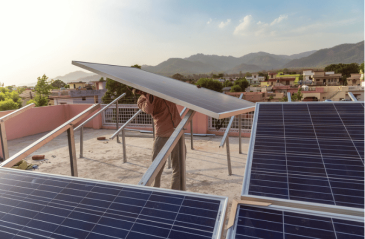
The power of storytelling in climate leadership

China has reiterated its commitment to be a “promoter and protector” of the Paris Climate Accord
Share articleThe Chinese government’s domestic agenda is now entirely aligned with cutting emissions
Share articleIt's possible to minimise the impact of climate change on current and future generations
Share articleWe put our vision for government into practice through learning partner projects that align with our values and help reimagine government so that it works for everyone.
President Trump's decision to withdraw from 2015 Paris Agreement has left an enormous vacuum in climate politics. But as other countries have scrambled to respond, China was quickly out of the blocks in order to reiterate its commitment, proclaiming itself as a “promoter and protector” of the climate accord, thereby stepping into the void left by the Trump administration.
What a turn of events. Prior to 2015, few could ever have imagined that China would step up to the plate in this way. So how did China opt to go green?
That China was not always the biggest supporter of the fight against climate change is hardly breaking news. In fact, the 2009 Copenhagen Climate Change Conference broke down, to a large extent, because of China's stance. Fast-forward a couple years and only three of the 74 Chinese cities monitored by the central government managed to meet official minimum air quality standards. Images of Beijing's “airpocalypse” became a staple of news coverage.
According to Chen Jiping, a former leading member of the Communist Party's political and legislative affairs committee, pollution became the leading cause of social unrest in China. Worrying that any further discontent might compromise stability, Premier Li Keqiang took to national television to declare a “war on pollution”, just five years after the collapse of the Copenhagen summit,
Although China is still the world's largest polluter, with an economy that is very reliant on heavy industry and an energy sector solely dependent on smog-producing coal, the winds of change have come fast and strong. China's incredible transformation can hardly be overstated. The Chinese government's domestic agenda is now entirely aligned with cutting emissions, which in the past it often presented as sacrificing economic gain.
In fact, statistics from China's National Energy Administration suggest that carbon emissions from the energy sector have already entered their fourth year of zero growth. China also dominates the dynamic renewable energy industry and is by far the world's biggest manufacturer of clean-energy technologies.
In China, “sustainable” has historically been simply another word for “expensive”. Today, the opposite is true. By implementing this new way of thinking, China is well aware of the rewards of sustainability, which include real economic gains and the spillover of innovation, lower costs and higher productivity, as well as a cleaner, more liveable environment and happier, healthier populations.
However, finalising an agenda is one thing, implementing it is another. It's important to note that transforming any country towards sustainability is far from easy, especially for an economy as large as China's. Many questions on strategy and execution remain. However, every step in the right direction matters, and with adequate preparation it's possible to minimise the impact of climate change on current and future generations.
First and foremost, China will need to align its climate change policies and targets to adhere to the 2°C limit. By signalling unwavering political commitment, China will be able to positively influence the initiative's legitimacy on a global scale. Increased legitimacy - a Public Impact Fundamental, remember - will, in turn, create the right conditions for China to achieve a higher impact in its climate change goals. China will be in a position to lead the race for cleaner energy by example, and this will empower it to take a tougher stance against climate change.
The other Public Impact Fundamentals also come into play when it comes to mapping China's future direction. While picking policies is undoubtedly a complex problem, it is not the number but the quality of policies that will matter. The policies China creates will need to be precise in nature and have clear objectives with feasible targets. A broad set of actors will have to be engaged to detail out the policies themselves, addressing matters such as timeframe, responsibilities, resourcing and compliance.
The final step will be to translate the policies into real-world effects through action. The Chinese government has the ability to frame an overall green vision and educate local industries about the benefits of sustainable development.
The dilemma is that, in spite of these efforts, the world is still heading for a temperature rise of 2.9°C to 3.4°C this century. It is time for world leaders to stand united and embrace environmentally responsible thinking. While the Paris agreement provides a flexible framework for climate action and has become a key foundation stone of sustainable development for billions across the globe, we, as citizens of this fragile planet, must continue to push for ever more ambitious action. Future generations depend on our doing so.












